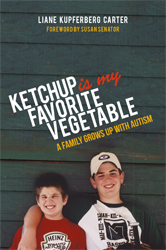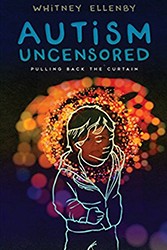Liane Kupferberg Carter is the author of Ketchup Is My Favorite Vegetable: A Family Grows Up With Autism. This week she continues her exclusive series on celebrating the Jewish holidays in a family with special needs as a Visiting Scribe guest contributor.
Each Passover, I struggle with the Hagaddah passage about the Four Sons. We’re told there is the Wise Child, the Simple, the Wicked, and the Silent. I know they’re meant to be symbolic, but would you want someone labeling your child as the smart one, the stupid one, the trouble-maker, or the one who has nothing to say?
Admittedly I’m sensitive when it comes to labeling children. My son Mickey has special needs. People have been labeling him for more than twenty years. Mickey is autistic. He has epilepsy. He didn’t learn to speak for a long time. So you can see why I cringe when we read that bit about the Simple or the Silent Child. My son is disabled, but he’s not silent, and he’s certainly not simple — in fact he is astonishingly complex: he makes profound observations, and asks startling questions. When his brother Jonathan first left for college, Mickey was disconsolate. “My brother doesn’t live here anymore? We’re divorced?” he asked.
When Mickey was small and the diagnosis new and painful, I used to feel as if other, “typical” families were feasting in a great restaurant, while my family of four stood outside, our noses pressed longingly to the window. With time, that feeling abated, but it resurfaces every Passover, when I think about how many special needs families don’t feel welcome at the table, their synagogue, or in their community.
At the seder, we fill a cup with wine for the prophet Elijah. We set him a place at the table. Elijah, we’re told, roams the earth disguised as a stranger, so during the feast we open the front door. If we should find a stranger on the doorstep, we are told to welcome him in kindly. It’s a metaphor for inclusion: everyone deserves a place at the table.
Mickey loves Passover so much he talks about it for months before. He doesn’t need a calendar — for him, family celebrations and holidays punctuate the passing of the year. At the seder, he’s proud when it’s his turn to read aloud from the Haggadah. He scarfs down the matzo, the only traditional Passover food he tolerates. He’ll peek to see where the we’ve hidden the afikoman. His diet is limited, so my thoughtful sister-in-law always puts aside the plain meatballs he likes; his cousin Lauren bakes his favorite flourless brownies for him.
Still, Mickey has yet to make it through an entire seder. There’s too much noise, and too many people. The spirited singing drives him from the room. “I’m out of here!” he announces. He retreats to a sofa, fits headphones over his ears, and cocoons with his iPad.
I used to be embarrassed about that behavior. But one of the things we say in the autism community is, “Behavior is communication.” When he isolates himself, he’s letting us know his sensory system is overloaded, which can trigger a seizure. Fortunately, our family understands, accepts, and accommodates. His place at the table is secure.
I like to remind myself that Moses, the hero of the Passover story, had special needs, too. He stuttered. Sometimes he needed his brother, Aaron, to speak for him. Each of us, if we live long enough, will probably have special needs of our own. We may need a wheelchair, or a hearing aid, or, like Moses, someone to speak for us. Disability is part of the human condition.
Inclusion isn’t just something to talk about during Jewish Disability Awareness Month in February. Each year, as we end the seder with the words, Next year in Jerusalem, we give voice to the hope that tomorrow will be better. My hope for next year: a place for everyone at the table.
Liane Kupferberg Carter is a nationally-known writer and advocate for the autism community and a co-author of the Autism Speaks Advocacy Took Kit.
Related Content:
- Liane Kupferberg Carter: What Does Purim Mean to My Autistic Son?
- Aviva Kanoff: This Passover, Play with Your Food!
- Sue Fishkoff: Making Kosher Food Is an All-Night Affair
Liane is a nationally-known writer and advocate for the autism community. Her work has appeared in numerous publications, including The New York Times, the Chicago Tribune, The Huffington Post, Tikkun, Kveller, and Parents Magazine. She is a co-author of the Autism Speaks Advocacy Took Kit.




